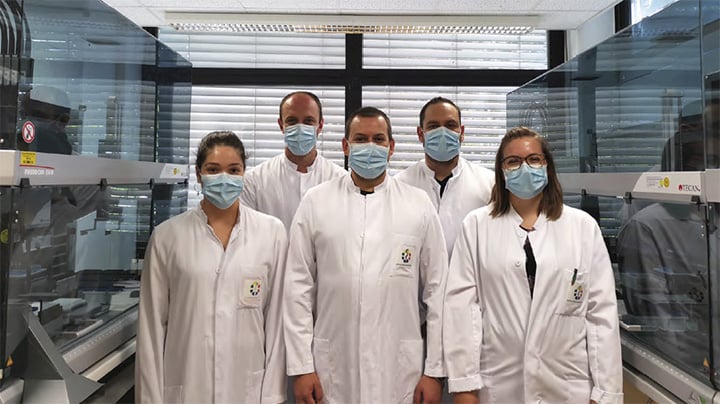Keywords:
Precision medicine is potentially revolutionizing diagnostics and treatment by targeting mutations that are specific to individual patients with various diseases, including cancer. The Institute of Pathology and Neuropathology at the Essen University Hospital, Germany, is following this ethos, relying on NGS to look for biomarkers associated with a number of key malignancies.
Rapid advances in genome sequencing technologies have enabled a fundamental new approach to treating diseases such as cancer, known as precision or personalized medicine. Identifying the genetic changes that have led to cancer in an individual patient enables clinicians to develop highly targeted treatment programs. This improves the efficacy of treatment and ensures that the drug toxicity load for each patient can be kept to a minimum, improving overall outcomes during and after therapy. Targeted analysis – often using PCR – focuses on looking for key mutations that have been associated with each cancer type. For example, variants in EGFR or KRAS are often found in lung cancer patients, while BRAF (V600E) mutation is linked to several types of cancer, including colon and lung adenocarcinoma, papillary thyroid carcinoma and melanoma. NGS is increasingly being adopted as a routine method to accurately identify these subtle changes, not least due to its high throughput and reliability. The Institute of Pathology and Neuropathology at the Essen University Hospital has adopted NGS at the heart of its operations, as Dr Thomas Herold, Head of the Molecular Pathology Diagnostic Lab, explained: “We are primarily interested in molecular analysis and diagnostics for cancer, with a focus on lung cancers, thyroid cancers, gastrointestinal stromal tumors and squamous cell carcinomas. We effectively serve as a molecular pathology core facility – receiving around 1,500 samples a year from centers across the state and Germany – and streamline sample processing for the pathology and neuropathology labs, from receipt to diagnosis, using methods like immunohistochemistry, fluorescence in situ hybridization (FISH) and NGS.”
 The team at the Institute of Pathology and Neuropathology, Essen University Hospital
The team at the Institute of Pathology and Neuropathology, Essen University Hospital
Dr Herold described the standard workflow for a surgical specimen: “Once a biopsy arrives, it is sectioned and embedded in paraffin, then analyzed using standard histological hematoxylin and eosin staining, FISH and NGS. All of the libraries for NGS are generated on one of our Freedom EVO® systems. After DNA extraction, we use a custom protocol developed by the Tecan application specialists to generate a high throughput sequencing library for our Illumina MiSeq® and NextSeq® platforms. In the past, this process required two days of work, but the libraries are now generated overnight, without the need for manual input, ready for analysis the next morning.”
The Freedom EVO has significantly improved our workflow, providing the lab with a highly complex system that offers minimal risk of contamination and significant time savings over manual sample processing.
“We chose Tecan because it was the only supplier that was open to new suggestions in our preliminary discussions. They truly acknowledged how challenging it would be to set up a new high throughput sequencing system that fulfilled our requirements; they were keen to tackle the challenge together in partnership with us. The first Freedom EVO was delivered in December 2016, and the first half of 2017 was spent working closely with the Tecan application specialists to ensure that our routine diagnostic protocol was running smoothly. The team was incredibly helpful, which was very much appreciated. Since then, the partnership has continued to evolve, as all parties have become more experienced. This has made the implementation of new protocols faster and easier than ever before; adding a second Freedom EVO early in 2019 has increased these opportunities even further. Now, one system is dedicated to the diagnostic workflow, while the other, larger system is used to optimize and validate protocols in parallel without affecting the routine throughput. This allows us to be more flexible in terms of workflow optimization and protocol design, and we also now have the capacity to analyze a larger number of samples when necessary.”
Dr Herold continued: “The Freedom EVO is simple and intuitive to use, with minimal training required for our technical team. The touchscreen interface guides the user through the set-up process; loading a run will only take one of our technicians around 45 to 60 minutes, and the rest of the process is completed automatically. The oncologists we work with expect a 10-day turnaround for results, and the new workflow has significantly reduced the total time to results to five or six days in most cases. This fast turnaround means that we get the results sooner – and can retest samples if necessary – to provide fast and accurate diagnoses for our patients.”
“The Freedom EVO has significantly improved our workflow, providing the lab with a highly complex system that offers minimal risk of contamination and significant time savings over manual sample processing. The support from the Tecan specialists has been excellent, even solving many queries easily by phone – we are very pleased with the service,” Dr Herold concluded.
To find out more about NGS sample preparation using the Freedom EVO platform, visit lifesciences.tecan.com/ ngs-sample-preparation
Keywords:









